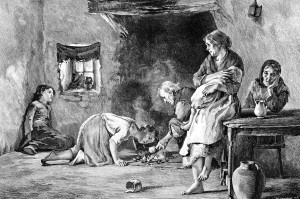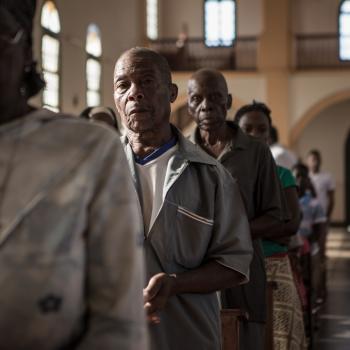 “Right there is where it started,” he says, pointing out the window to emerald pastures several headlands away. Here, where the forty shades of green meet surprisingly blue seas on the southern coast of Ireland in West Cork, a breathtaking tableau dappled with dairy cows in any direction, blight is not a word that comes to mind.
“Right there is where it started,” he says, pointing out the window to emerald pastures several headlands away. Here, where the forty shades of green meet surprisingly blue seas on the southern coast of Ireland in West Cork, a breathtaking tableau dappled with dairy cows in any direction, blight is not a word that comes to mind.
But right there is where the Great Famine began.
We’re standing in late August at what will be my desk until Christmas, on a quick tour of the house whose owner should be packing for America. But with his Irish sense of time, one quite different and more expansive than my American variety, he has already taken us on a boat ride and is about to lead the way to a digging lesson up in the potato garden.
Minutes later, pitchfork in hand, I unearth a healthy bunch of spuds from rocky soil and am no less delighted than my children by the sight. The dirty yellow skins make a fine addition to the jeweled picture stretching out before us from Union Hall to Skibbereen—the finest of all, no doubt, if we were a family of five facing starvation in the mid-1800s.
That was three months ago, when we arrived for a family sabbatical now about to end. Given the somewhat last-minute nature of the plan put together over the summer, I had no idea that we would be living so close to the origin of Ireland’s defining watershed.
My own Irish-American heritage notwithstanding, and dual citizenship to boot, I found myself embarrassingly uninformed about the very epoch that eventually led my father’s father to join the wave of emigration spawned by the catastrophe for generations to come.
Not that I’m greatly more informed about it now, beyond a basic understanding of the causes, scope, and political legacy. But what I have come to know more than anything, sitting here day after day at my desk with its view of those once-blighted headlands, is that I am starving.
Spiritually speaking, this condition is not an exact correlative of an Gorta Mór, the Great Hunger in Ireland’s native tongue, for two main reasons: first, the unimaginable suffering brought about by the historical famine obliterates any such facile correlation; second, the unquestionable nourishment I have received qualifies the comparison considerably.
And yet, this great hunger is just that.
For when I came to Ireland entirely well-fed and altogether famished, I came planning that our family sabbatical would double in ways as an individual semi-retreat. I would be working, yes, but far away from the hectic elements of life back in Brooklyn: no daily commute except the shuffle from bedroom to home office; no alternate-side parking rules in effect; no fire trucks, no walk-up, our youngest off at playschool.
Best of all, pictures of the house had featured a conservatory facing the sea; and one not furnished as a sitting room, but kept spare as a yoga room. With 180 degree views by day and a window on the heavens by night, it would be my glass tabernacle in the blue-green wilderness. A sanctuary in which to practice my Son salutations before sunup.
Three weeks in to our stay, it was Yom Kippur. In light of the tabernacle theme that had so infused my morning routine, I saw fit to observe the holiest of Holy Days on the Jewish calendar in my limited and solitary Christian fashion.
And what better way to amplify the fast than with a visit to the Skibbereen Heritage Center’s exhibit on the Great Famine while my wife and kids hit the farmers’ market? Such an outing was perhaps in violation of a proper Yom Kippur observance, but my stay-at-home-alone alternative probably was, too. (Good luck finding any synagogue whatsoever in these rural Irish parts, let alone a Messianic one.)
If the exhibit amplified the fast—which tends to amplify itself quite intensely by the hour more for the lack of water than food—it also helped qualify the eventual comparisons I would make between that Great Hunger and this one.
Yes, I am starving for God; for the bread of heaven and the river of living water to break the lifelong fast that a hard heart comes to feel like with its vain abstinence from love— both given and received. I want to put away childish things, as the saying goes in Paul’s Letter to the Ephesians, and graduate from milk to solid food, as it says in the Letter to the Hebrews.
But this hunger is no correlative to entire families immobilized by starvation and disease in their unwinterized stone cottages, left to watch each other die one by one until the last hope of help was extinguished. It is no freak show scenario of some victims gaunt with dysentery and others inflated with dropsy, of the dying buried alive in mass graves because they would be numbered among the dead soon enough.
No, this is not that.
And yet, and yet. There have been moments in the glass tabernacle when the emaciating effects of shame and the ballooning effects of pride have combined in such a way as to leave me looking so much the same that you wouldn’t know the difference unless you were God.
For years I have kept a pocket-sized notebook inscribed with favorite verses from scripture, and there is no telling now how telling it is that the very first one I logged is Amos 8:11.
Behold, the days are coming, says the Lord, when I will send a famine in the land; not a famine of bread, nor a thirst for water, but of hearing the word of the Lord.
Perhaps I knew more back then spiritually than I assume. Perhaps this great hunger all along, which in Ireland has come into sharp relief in both senses of the word, has served a satiating purpose in its own right.
And perhaps that’s a good thought to keep in mind in the fittingly brief transition from Thanksgiving’s surfeit to Advent’s want.
Bradford Winters is a screenwriter/producer in television whose work has included such series as Oz, Kings, Boss, and The Americans. His poems have appeared in Sewanee Theological Review, Spoon River Poetry Review, and Georgetown Review, among other journals. He lives in Brooklyn with his wife and three children.











